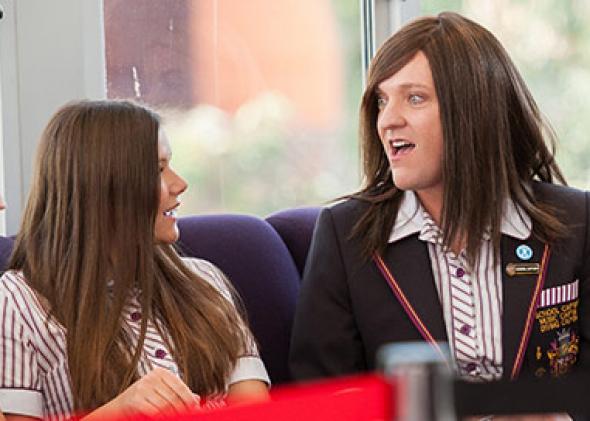When we last saw Ja’mie Louise King, the haughty, overconfident, manipulative, sneering, and yet insecure teenager was leaving us, driving away from her “study abroad” in an Australian public school in her mom’s luxury car with her posh friend Brianna. As a proud private-school girl, she’s had a difficult sojourn slumming it among the “povo (pronounced pover).” But she’d approached it with the same sense of noble charity that she’d displayed when raising money for AIDS work in Africa, which is to say, for the fancy high-school formal she wanted to throw but which the school couldn’t afford. “I hope tonight’s formal has taught you guys that just because you go to a public school and you’re povo it doesn’t mean that you can’t have a good time,” she advised dance attendees. “Do you know what I mean? Seriously, like, stop worrying about money and get over it and just have an amazing time!”
In the five years since writer/director/actor Chris Lilley’s mockumentary Summer Heights High, a mad portrait of an Australian high school in which Lilley played all the main roles, came to the U.S., 17-year-old Ja’mie has only advanced one year in school, but much else has changed. We are told in the first episode of Lilley’s new HBO series, Ja’mie: Private School Girl, which premieres this Sunday night, that Brianna, for instance, has gotten “really weird and, like, fat and a bit indie,” requiring Ja’mie to end their friendship to make room for a new posse of sycophantic pretty girls. School Captain Ja’mie and her crew patrol the grounds of Hillford Girls Grammar School enforcing administration policy as well as their own rules, including that a girl’s “box gap” (i.e. the space between her thighs) should be at least three fingers wide. Less than that and one risks not being “quiche,” defined by Ja’mie as “like hot, but like a step above hot.”
If “quiche” sounds a lot like “fetch” to you, it’s true that Private School Girl is in some ways Tina Fey’s Mean Girls with an Aussie accent. But Lilley’s vision of privileged high-school life lacks the moral redemption narrative at the heart of that film, instead achieving a kind of shock-and-awe hilarity through the sheer moxie of Ja’mie’s tone-deaf narcissism. Even among her own wealthy class at Hillford, she finds ways to establish hierarchies—for example, though the boarding students are also rich, we’re told they are “like, rural” and “all lesbians.” And as at Summer Heights High, Ja’mie again asserts her calculated ethical superiority by helping Africans in the most racist possible terms—in this case, inviting a boy, Kwame, from the black suburb across town to live in her family’s mansion. Ja’mie: “It’s this really povo area where these Africans live and it’s really cute. They’re really povo but they sort of look really fit—because they’re not eating.”
Thankfully, Private School Girl doesn’t just stay on campus. Ja’mie’s South African–born parents are predictably disconnected, her mother a Xanax-soaked salad leaf (whom Ja’mie constantly calls a bitch) and her father an easily manipulated businessman with a quiche young assistant named Mandy. And though Ja’mie’s obsession with the size of other girls’ breasts continues, we also learn that she enjoys receiving “dick pics” from boys at Hillford’s brother school in her spare time—at least when she’s not checking Facebook while driving or Snapchatting in her house’s elevator.
All in all, Private School Girl features the best parts of Summer Heights High, distilled: The exuberant crassness and sly social commentary are stronger here, and, along with Lilley’s anthropologically rigorous performance of a certain kind of teenage girlhood, we get all the campy scoring and ridiculously lascivious dance numbers (in one case, featuring all the uniforms of Hillford’s 100 years!) that made Summer Heights High great. And don’t worry: If, like me, you haven’t seen anything on TV that quite lives up to Mr. G’s musical finale in Summer Heights High, the deliciously baroque (and strangely feminist) climax of Private School Girl leaves little doubt that Ja’mie is still a very naughty girl with a slew of bad habits—and I hope she never breaks them.
Update, Dec. 4, 2013: Since this review was published, a number of Aussies have written in regarding our spelling of an Australian slang term for poverty that Ja’mie uses repeatedly as an insult throughout Private School Girl. This post has been updated to clarify that the phrase is spelled povo but pronounced pover.
